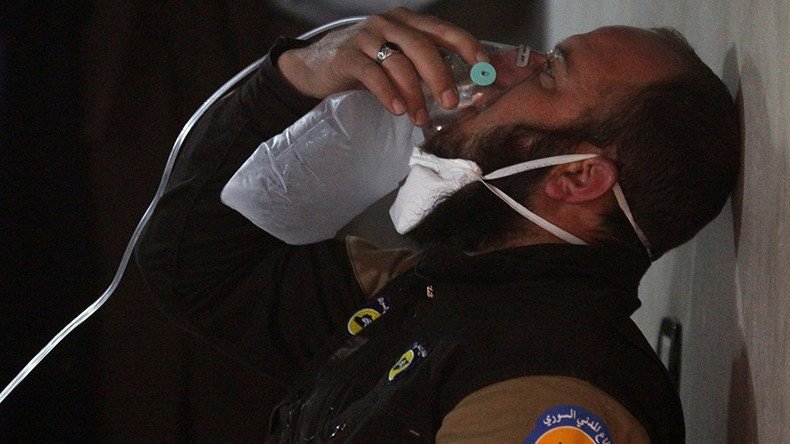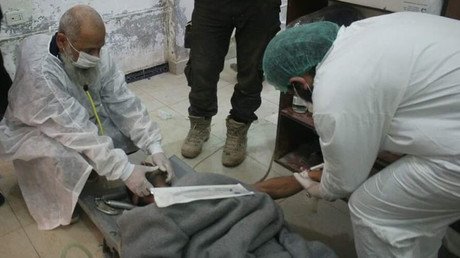Moscow slams French report on Syria chemical attack as inferior substitute to stalled OPCW probe

Russia has questioned the integrity of a French intelligence report, which blames the Syrian government for the Idlib chemical attack, emphasizing that no amount of national probes will ever make up for the absence of an impartial international investigation.
“It seems that these countries either do not trust the OPCW, or trying to influence its work in the direction they need,” the Russian Foreign Ministry said on Tuesday referring to the latest French report that echoed previous claims by British and Turkish experts.
On Wednesday, France ‘declassified’ a 5-page document accusing Syrian government forces of carrying out a sarin nerve gas attack on April 4 in northern Syria, which reportedly killed up 100 people and injured hundreds more.
The French report in its conclusions stated that only President Bashar Assad or members of his inner circle could have ordered the strike on the town of Khan Shaykhun in Idlib province.
The document claims the conclusions are based on samples obtained from the impact strike on the ground and a blood sample from a victim.
Earlier, the UK and France claimed that their experts have “received” samples from the site of the incident, which they passed on to OPCW labs who then identified the chemical agent used in the attack as sarin gas.
The Russian Foreign Ministry questioned the validity of the evidence and consistency of the French intelligence report in general.
“Preliminary analysis of the five-page French document raises many questions: First of all, regarding the circumstances under which the French side obtained the samples allegedly gathered directly at the scene of the incident.”
“If the French intelligence services collected the samples themselves, then it means they have free access to the area controlled (as they say in the report) by Al-Qaeda-linked armed groups of the Syrian opposition.”
“If the samples were obtained in some other place… then the consistency of the conducted analysis is immediately in question,” the ministry said, noting that under international regulations, the samples, in order to avoid any meddling, must be absolutely secure across the entire route; from the scene to laboratory.
‘For us, 100% it’s fabrication, Syrian military destroyed all chemical weapons’ – Assad on Idlib attack https://t.co/cZ2ZFlKxMXpic.twitter.com/a67JIfUM7v
— RT (@RT_com) 13 April 2017
Moscow also questioned the validity of the French claim that the chemical found in the sample – hexamine – was a hallmark of sarin produced by the Syrian government.
The Russian Foreign Ministry queried how the French established the “full recipe” when no ready-to-use form of sarin was ever found in the hands of Damascus and all the “precursors” of the deadly gas were exported outside Syria per 2013 agreement.
UN doesn’t send experts to Idlib 'chemical incident' site as West & US are blocking it - Assad https://t.co/zttcotULbEpic.twitter.com/FUfJTUgQ2X
— RT (@RT_com) 20 April 2017
In addition, Russia noted that all the installations under Damascus’ control “on which the synthesis of sarin could be performed, were destroyed, as confirmed by the Organization for the Prohibition of Chemical Weapons.”
According to the French report, the new sample was compared to another one of questionable integrity; this time obtained from a 2013 attack, in which an intact, unexploded “hand grenade” containing 100 milliliters of sarin was allegedly dropped from a government helicopter.
“The use of hand grenades for the deployment of sarin is something new. As far as we know, there were no precedents in the entire history of chemical weapons existence. Such an exotic chemical munition, to put it mildly, is not safe for those who would use it,” the Russian Foreign Ministry said.
'UN commission hasn't ruled out any version concerning the causes of release of nerve agent' in Idlib - chairman https://t.co/wd0UjuctR3
— RT (@RT_com) 22 April 2017
Moscow once again underlined that a national investigation will never be as reliable as an international inquiry, and only a mission of the Organization for the Prohibition of Chemical Weapons (OPCW) can establish the truth regarding the alleged use of chemical weapons.
Idlib ‘chemical attack’ was provocation to set Assad up, more may come - Putin
— RT (@RT_com) 11 April 2017
DETAILS: https://t.co/A1Sj0j1byQpic.twitter.com/InD1HGImTD
“Once again, we call for stopping foul political games around the Syrian chemical dossier and to make the steps Russia has been insisting on for the past three weeks, which is, to delegate a group of experts directly to Khan Shaykhun and Shayrat,” the press release said.
“The group should include representatives of the countries that are not blinded by hatred towards Syria’s legitimate government.”
Lavrov: False information about use of chem weapons by Syrian govt is used to move away from Resolution 2254 https://t.co/NYQQ1mavuHpic.twitter.com/TA9MBQMRyy
— RT (@RT_com) 21 апреля 2017 г.













